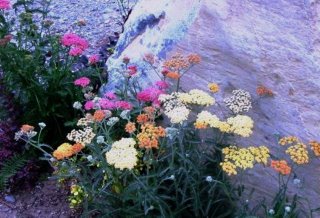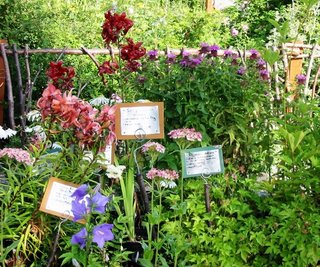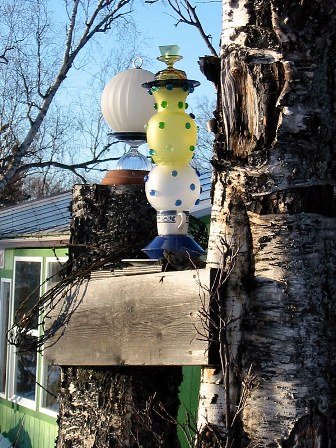
It always amazes me that the perennials that color my garden in August are, for the most part, the big dogs of summer. Like fists rising from the soil, they tower above the garden in defiance of the frosts sure to come by mid-September. Magnificent Inula is opening her golden rayed flowers studded with bumblebees above huge tobacco-like leaves that glow with a fresh summer lime green. The
Late bloomers in our gardens aren’t always looking down at us, but, many are so large that it takes all summer to grow before they can get around to flowering. Trying to figure out how to extend your garden’s bloom and color right into the frost isn’t difficult. You need to get out and visit public gardens such as the Matanuska Valley Agricultural Showcase Garden at the Visitor's Information Center in Palmer, the Alaska Botanical Garden in Anchorage, the various garden displays at the State Fair grounds, the gardens at some of the small specialty nurseries, or just take a Sunday drive to check out what’s blooming in the neighborhoods.
Asiatic lilies, particularly the tall1c or down facing types, can be in bloom right up
to the last weeks in August.The lacquer red ‘Red Velvet’is an old-fashioned small blossomed lily that looks at her feet instead of the sky. Tiger lilies are also late bloomers that come in freckled white, yellow, red, and pink nodding
trumpets. The taller varieties of Veronica should still have some bloom left and make a
good pairing with lilies. Under plant these sun lovers with some Dianthus deltoides, a creeping, self-seeding pink that comes in wine red, deep pink, or white.
Other late bloomers are Monarda, Yarrow, Sedum, and Filipendula Rubra Venusta (meadow sweet). The Sedum will need good snow cover, full sun, good drainage, and hopefully no winter rains and ice, to survive our winters. The Yarrow family tends to be promiscuous and seeds itself everywhere spreading surprise colors all over the driveway as it loves gravel and poor soils. I love volunteers and spontaneous plant surprises, but, yarrow are easy to deadhead and their seedlings easy to spot for weeding out of your beds. A member of the mint family, Monarda likes good rich soil, regular watering, and dividing to perform well or it is a short-lived perennial. Like the yarrow, it is also an herb that can be used for tea and culinary use with leaves that have a marjoram-like fragrance and flavor.
Foliage and shrubbery are an important background for the late summer garden. The annual salad herb, Atriplex hortensis, also known as Mountain spinach or Red orach, has a beautiful deep burgundy color. A relative of the equally tasty weed, Lamb’s Quarters, the leaves can be used raw or cooked and make a great floral filler for cut flower arrangements. Colorful shrubs such as the green- gold Spirea japonica varieties, ‘Fire Light’ and ‘Magic Carpet’, have a red tinge to their leaves that is enhanced by cool weather. Their deep pink flowers are an added plus in the late garden. The florescent gold leaves of Physocarpus opulus ‘Luteus’ (Ninebark) and Berberis thunbergia ‘Aureum’(Thorn berry) really set off the deep plum and rich burgundy of their siblings Physocarpus ‘Diabolo’ and Berberis thunbergia ‘Rose Glow’ and color the garden all season long.
 Remember, you can plant your perennials and most shrubs as late as September, so you can still find a few bargains at the nurseries to plump up your late summer garden color. These cloudy days are perfect planting weather, so keep on gardening!
Remember, you can plant your perennials and most shrubs as late as September, so you can still find a few bargains at the nurseries to plump up your late summer garden color. These cloudy days are perfect planting weather, so keep on gardening!




4 comments:
PICTURE PERFECT! Your painting is perfect as I study it with my magnifying
glass. What a lucky lady to stand among your summer delights and capture them on canvas!! Now how perfect a picture is that!:) Did you brush over the last photo with blue paint. :)
Ahh, but that's not me dear. The artist in the photo is the lovely Marilyn Chevalier, an old friend of mine. We had the local Plein Air artist's group out for the afternoon and had a lovely time. I only wish I could draw flowers! My paintings are strictly in the cartoon genre! Sculpture is my forte. Brooke
I think Asiatics are over by early July. Orientals do bloom into August.
I can't tell if any lilies appear in your photos--all I recognize is campanula, and maybe achillea (?), canna (?), daylilies(?), but the flowers are lovely.
I don`t have a magnify glass but from what I can see you are a beautiful artist.
To be able to paint....sigh
tea
xo
Post a Comment